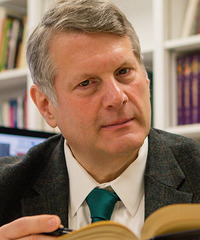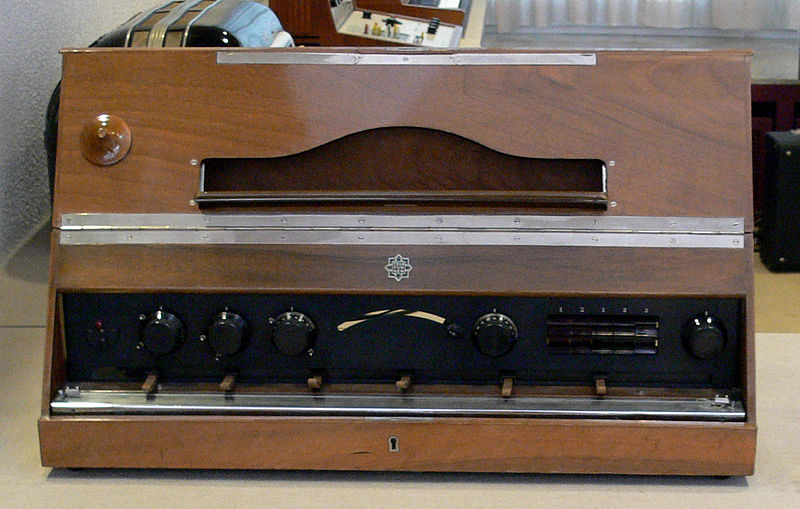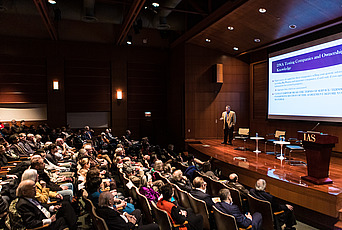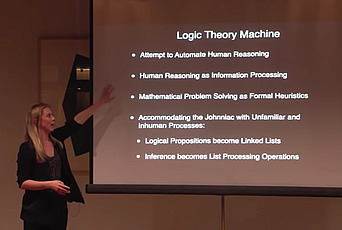Myles W. Jackson, Professor in the School of Historical Studies at the Institute for Advanced Study, is a historian of science who explores the intersection between science, technology, music, history, and society. His cross-disciplinary research encompasses topics as diverse as molecular biology, physics, gene patenting, the history of nineteenth-century German scientific knowledge, and the interactions between musicians, scientists, and radio engineers. Here he talks with IAS’s Distinguished Journalism Fellow Joanne Lipman about why Germany has been more successful than other countries in combating Covid-19, the perils of gene patenting, and how his cello playing led to his scientific pursuits. This conversation was conducted on April 27, 2020. It has been edited for length and clarity.
Joanne Lipman: You are an expert on genes and gene patenting. How does that relate to the work being done now on Covid therapies?
Myles W. Jackson: I mostly work on gene patenting, so not necessarily on biomedical research in general. But I’m sure that big pharma and all the labs around the world will be going full speed ahead for antibody research. They haven’t developed a medicine yet, but certainly all laboratories will try to patent the antibody test as well as the tests to identify the virus.
JL: You have written about the perils of gene patenting. What are your concerns?
MWJ: The classic is the work I’ve done on the breast cancer genes. Myriad Genetics of Utah had the patents on the actual genes as they occur in nature, all the possible mutations, including the ones they hadn’t found yet, and also the diagnostic kits.
There were other people who said, “Look, your tests don’t reveal all possible mutations. We’re creating these tests, and we want to use the gene.” And Myriad sent cease and desist letters to them.
The case went all the way up to the U.S. Supreme Court. I wrote an amicus curiae brief that basically said patents in general were supposed to enhance innovation and invention, by doing away with trade secrets. But there are a number of cases were patents actually thwart research, because one thing a patent guarantees you is the ability to stop someone else from doing what it is you want to do. In addition, simply patenting a gene as found in nature does not contribute anything to the “art.”
The argument was always, well, you have to patent genes. It’s inevitable. If you patent genes, they become commodities, more research gets done, they financially reward people who are innovative, blah blah blah. So I said, no, it’s not inevitable.
In my deposition, I said, let’s go back to 1905. We know that over 90 percent of pharmaceutical sales in the world belonged to German companies. They dominated by far worldwide pharmaceuticals.
And I said, Germany had a law that says thou shalt not patent chemicals. So clearly, they were able to make a fortune on pharmaceuticals without being able to patent the chemicals.
JL: So your argument is that patenting genes, rather than encouraging competition and innovation, can actually stifle it instead. Did the Supreme Court agree?
MWJ: The Supreme Court decided nine to zero to say that breast cancer genes as they exist in nature are not patentable. But if you make a copy of it, you may patent the copy.
It was a compromise decision. I knew it was going to end that way, because I didn’t think the Supreme Court was going to be that wild and crazy, that revolutionary, to say “thou shalt not patent genes.” They basically said, we want to strike a balance. On the one hand, we want to reward innovation. On the other hand, we don’t want practices like those of Myriad Genetics to stop laboratories from developing other tests.
JL: One way that gene patents are used is to create medicines for specific racial or ethnic groups. You’ve been skeptical of that approach as well.
MWJ: With race-based medicine, I basically ask, how are we defining race? What does that mean in twenty-first-century America? What does it mean, for example, to be African-American? That could be almost anyone—and there are studies that show anyone who has 20 percent African ancestry all the way up to 100 percent African ancestry are self-described as African-American. Indeed, the most genetically diverse group of people on Earth are from Africa, because that’s where humanity started.
My point is always you need to define race, and you also need to ask, is race a proxy for something else that’s going on? The classic example that we know historically, sickle cell anemia, is not the “negro disease,” as it was defined a hundred years ago. All of a sudden we saw it crop up in Italy, in the island of Orchomenos in Greece, in India, and Iran, I believe. We said, oh, wow, isn’t this interesting? It’s where malaria strikes. So sickle cell anemia, if you’re heterozygote—one normal copy of a gene, one disease copy—you’re by and large immune to malaria. It’s an environmental disease, not a racial disease.
Another—Tay-Sachs—is seen as a Jewish disease because of its high rate among Ashkenazi Jews. Many have subsequently been screened for it; hence, its incidence among this population has been drastically reduced. It turns out now that there are communities in South America as well as French-Canadians, Irish, and Cajuns that have been afflicted by Tach-Sachs. Many members of these communities claim that they know of no Ashkenazi Jewish ancestors.
So a lot of diseases that we thought were somehow race- or population-specific turn out not to be. And that has interesting implications if you’re a doctor. Someone comes in and says, I want to test for certain diseases. Well, you don’t look as if you belong to this “racial category.” The problem is, skin color is a very bad proxy for race, as we know.
We want to help communities who have been discriminated against historically, but how do we do that without reifying the notion of race in a very dangerous way? And I think that’s the challenge that everyone needs to know about.
JL: Much of your work has focused on Germany, which has been a leader in terms of containing Covid. Do you see a historical or cultural reason for that success?
MWJ: Part of it is a story about German healthcare. They have a universal, multi-payer system that is funded by a statutory health insurance as well as private insurance. So certainly, their medical system is rather vibrant. I’ve had one bad experience in a German hospital, but by and large, they’ve been okay.
But it’s also the fact that the German government is headed by someone like Merkel, who actually understands science, unlike our President of the United States. And so they realized early on that this definitely could be problematic, and they began to shut things down. Not everyone followed those orders, but there was a general shutdown.
Where they really have done very, very well is in testing. They’ve tested a very real percentage of their population, so that they have an idea of where to go next and where the hot spots will be. I think that’s what you can learn from the Germans. The death rate is so low because of how quickly they responded, how quickly they put people who were at risk on notice to get them tested first.
They also have medical ambulances that drive to people’s houses, almost like doctors’ house visits, in order to decrease the amount of contact that sick people have when they’re diagnosed. So I think they’ve been much better at controlling it.
A lot has to do with Merkel’s government. They’re not idiots, to put it mildly.
JL: Has Germany historically been ahead of the curve on public health?
MWJ: Certainly, the idea of the right of everyone to get medical treatment and the importance of laborers to the economy have been established since Bismarck. So for example, in the United States, generally and historically the poor and people of color have not benefitted as much as the more affluent and white communities have. In Germany, the idea is if the workers are healthy, the nation’s healthy. Indeed, Germany has the oldest social health insurance system in the world, dating back to Bismarck in 1883.
Otto von Bismarck was no Marxist by any stretch of the imagination, but his was an economic decision. And today, unions play major roles in large German companies, which are required to have up to 49 percent of workers on their governing bodies if the company has 2,000 employees or more, something known as codetermination. We don’t have that in the United States.
In part because of that, you have unions that are very powerful, that demand medical rights and medical insurance. That’s the importance of labor to Germany economically, they realized that in the nineteenth century.
The unions didn’t have power during the Nazi period. But after the Second World War, certainly in West Germany, even today, the unions are much more powerful than they are in the United States—which is a low bar in the United States. A lot of the power of the unions has been to guarantee that everyone has access to medical expertise in Germany.
JL: What are you researching now, in quarantine?
MWJ: One thing I’m working on is how has the relationship between science, technology, and music changed from the late eighteenth century to the present.
We’re at a point now where computers can compose. You can program them with machine-learning techniques to compose in the baroque style, in the style of Bach. You can actually have them improvise, like jazz musicians do. It’s really amazing to see how notions of human creativity get challenged as uniquely human when we apply computer algorithms for musical composition.
So right at this very moment, I’m working on the ways in which physics, physiology, and radio engineering did two things. One is improvement of radio broadcasting in the 1920s, and the other is the rise of electronic music.
The Connection Between Music and Science
JL: What is the connection between music and science?
MWJ: The relationship between music and mathematics and science, natural sciences, goes back millennia. We think of the ancient Greeks. Pythagoras is a classic example. He believed in the musical basis of the universe, as did Plato. He believed that there was a musical kind of harmony of the spheres.
And he’s the one who says—and he got it right—that different length strings will produce different pitches. And that if you have one string that’s say, one foot or meter or one of any length, and another one that’s twice as long, the long one would sound an octave lower than the first one. And so there are certain ratios that produce harmonious sounds, like perfect fifths (in a ratio of three to two), or major thirds (five to four), etc. That’s been known since Pythagoras, for thousands of years.
And you had in the Middle Ages this notion of the musical spheres of the universe. Many people believed that music on Earth was a microcosm of the celestial music of the celestial spheres.
The greatest (and later) example of this concept is the work of Kepler, a major player in the so-called Scientific Revolution. Kepler is the one who famously argued that planets go around the sun in ellipses, not in circles. What a lot of people don’t realize is, his work of 1619, which was translated in English as The Harmonies of Earth, talks about how, since planets move in ellipses, they’re slowest when they’re furthest from the sun, and they’re fastest when they’re closest to the sun. And he says at those two points, when they’re furthest from the sun and closest to the sun, musical ratios are generated.
He goes on to say, if one could hear sounds above the Earth—he did not think one could—one would hear the notes of the planets, that each planet has a different ratio, the farthest and closest it was from the sun.
Modern physicists often laugh at this. What they might not know is that what we now call Kepler’s third law of astronomy—T squared is proportionate to R cubed—comes from the fact that he actually believed that the planets, if you could hear them, are sweeping out tunes in space. He’s totally committed to the relationship between the universe and music.
JL: How did you decide on that topic?
MWJ: I was in the archive, and was reading these bizarre letters of complaint from old Germans who were upset that the radio station had broadcast a string quartet of Beethoven’s, Heiliger Dankgesang, in which they claimed a flute was substituting for the violin. I thought that was strange. I mean, there’s a lot of fascinating avant-garde stuff going on in Berlin at the time, but like the great song by Jim Croce says, “You don’t tug on Superman’s cape, you don’t spit into the wind,” and you don’t mess with Beethoven.
So I was wondering what in the world… And then the radio station in Berlin responded, “We didn’t do anything. This was a string quartet.” It’s just that given the limitations of broadcasting and radio technology in the 1920s, flutes were difficult to differentiate from violins. They sounded very similar, as did clarinets.
And it turns out in parts of Beethoven’s Ninth, the basses fall out. All of a sudden they’re not there, the double basses. And some of the operas, the bass voice is not always present. That’s because the lower tones were difficult to transmit. They just fell off, right? They just disappeared.
I was interested in asking, well, why is it that we turn on a radio today, we don’t have that problem? What changed? How did they get it right? And it turns out there’s a fascinating story that requires the intense work of physicists, radio engineers, physiologists, musicians, composers in particular, and the rise of radio as a genre of entertainment, not only in Germany, but worldwide.
It involves some of the great German authors, like Brecht, some of the great physicists and physiologists. There’s a relationship between studying the ways on the one hand in which humans make vowel sounds (and vocal sounds in general) and the way vowels (and vocal sounds) are subsequently broadcast, and on the other hand how musical instruments sound when listening to them live and when they are then broadcast on radio. That relationship is absolutely critical to the story. And that’s going to explain how you can understand why, when you’re listening to Jacqueline du Pré, you say, that’s a cello, and don’t think it’s a bassoon.
The Nazis and Electronic Music
JL: You’ve connected two streams of research—one on the history of radio in Germany, and the other on electronic music. How do they relate?
MWJ: Radio, you know, was the tool of propaganda for Joseph Goebbels. The Nazis take radio over and do some interesting things with electronic music which surprised me, i.e., they did not ban it. I thought they would absolutely abhor it—it’s kind of a lefty, in many cases Jewish music, or “degenerate music” as they called it.
They didn’t ban it, to my surprise. They had a ban against some of the composers who composed electronic pieces, like the famous Paul Hindemith, the avant-garde composer. But Goebbels loved this one instrument called the trautonium, which is an electronic musical instrument. The Nazis paid for the building of its later versions, such as the concert trautonium and the radio trautonium. There’s actually a volkstrautonium, a trautonium of the people, that was supposed to become a household instrument and that was funded in part by the famous radio and electronics company Telefunken.
It was very counterintuitive. Oskar Sala, who was a virtuoso on the instrument, actually toured occupied countries, like Holland, in 1940, to give them a concert with this new electronic musical instrument. It’s a precursor to the synthesizer.
JL: Why would the Nazis be interested in the trautonium?
MWJ: They thought that this was an example, much like the radio, of something that if it were cheap enough, the trautonium could become an example of “house music.” It was initially meant to play microtonal pieces, which the Nazis did not like, so they quickly changed its use to play classical pieces, great Germanic works. It expressed an aesthetic, so-called “steely Romanticism,” which appealed to Goebbels.
It was also seen as being a Germanic invention. The Nazis had a very ambivalent relationship with technology. On the one hand, they loved it because it supplied things like V2 rockets, and it improved aviation, and radio broadcasting. On the other hand, technology was artificial, right? It wasn’t like nature. It wasn’t back to nature.
But this aspect of technology they liked a lot, and they thought it could actually in a sense bring more German culture to the masses and to occupied territories.
JL: Speaking of the cello, you played the cello as a kid.
MWJ: Still do.
JL: Are you a serious musician?
MWJ: I don’t do it professionally because I would never want to, because it’s my therapy. So it’s like a cheap shrink, although I bought a new cello about five years ago, and it was not a cheap shrink, that’s for sure.
JL: I have one of them too. Viola.
MWJ: Viola. I’m going to tell my daughter, play the viola. I’m going to tell her right now, don’t think about another instrument.
JL: Awesome instrument.
MWJ: It’s a great, great instrument.
JL: Do you play chamber music?
MWJ: Yes. I do. Quite a bit.
JL: With people at IAS?
MWJ: People at Princeton. We want to have an IAS group, but it depends every year on the people who are coming in
JL: Well, if we can find a couple of violinists, we can have a string quartet!
MWJ: We absolutely can.






